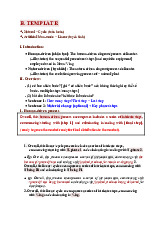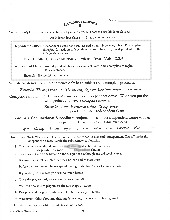



















Preview text:
S6.5 PART 1 CHARACTER TRAITS
What character traits of yours are you most proud of?
Do you find it easy to talk to strangers?
Do you like spending your free time alone or with friends?
What character trait of yours do you think is going to benefit you in the future? THE INTERNET
How often do you use the Internet?
How long in a day do you spend on the Internet?
What platform do you usually use? Why do you use the Internet? ACCOMMODATION
What kind of accommodation are you living in at the moment?
What does your room currently look like? What is your favourite room?
What kind of facilities are there near your house?
Would you like to move to a different home in the future? SPORT What sports do you like?
Where did you learn how to do it?
Did you do some sports when you were young?
Do you think students need more exercise?
What sports are the most popular in your country?
What sports would you like to try in the future? BIRTHDAY
What do you usually do on your birthday?
What did you do on your birthday when you were young?
Do you think it is important for you to celebrate your birthday?
Whose birthday do you think is the most important to celebrate in Vietnam? COLLECTING THINGS Do you collect things?
Are there any things you keep from childhood?
Would you keep old things for a long time? Why?
Where do you usually keep things you need? HOUSEWORK AND COOKING
Do you do some cooking or help your family cook at home now?
Do you think your home is clean and tidy?
Do you have breakfast at home every day?
Do you want to learn how to cook well?
What housework do you like or dislike doing? MORNING TIME
Do you like getting up early in the morning?
What do you usually do in the morning?
What did you do in the morning when you were little? Why?
Do you spend your mornings doing the same things on both weekends and weekdays? Why?
BOOKS AND READING HABITS
Do you often read books? When?
Are your reading habits now different than before?
Have you ever read a novel that has been adapted into a film?
Which do you prefer, reading books or watching movies? SNACKS
What snacks do you like to eat?
Did you often eat snacks when you were young?
When do you usually eat snacks now?
Do you think it is healthy for you to eat snacks? WEATHER
What’s the weather like where you live?
Do you prefer cold or hot weather?
Do you prefer dry or wet weather?
Would you like to visit other cities that have different climates from where you live? SINGING Do you like singing? Why?
Have you ever learnt how to sing? Who do you want to sing for?
Do you think singing can bring happiness to people? SCIENCE Do you like science?
When did you start to learn about science?
Which science subject is interesting to you?
Do you like watching science TV programs? BORING THINGS
What kinds of things are boring to you?
What will you do when you feel bored?
What was the most boring thing you did when you were young?
Do you think school is boring? TELEVISION Do you like watching TV?
How much time do you spend watching TV? When do you usually watch TV?
What types of TV programmes do you like watching?
What types of TV programmes are popular in your country?
Why do children like watching TV? EMAIL How often do you use email?
What do most people in your country use email for?
What are the advantages of email? Are there any disadvantages?
Do you think that email will replace letter-writing? SHOPPING Do you like shopping? How often do you go shopping?
Do you like shopping on the internet?
Do you have any favourite stores? FILMS Do you like watching films?
What types of films do you like watching? How often do you watch films?
Do you prefer watching films at home or at the cinema? WEEKENDS
What do you usually do on the weekend?
What do people usually do on the weekends in your country?
Do you think your weekends are long enough?
How important do you think it is to have free time? TRAVELLING Do you like travelling?
Do you prefer travelling alone or in a group?
When you visit new places, what do you like to do?
What places would you like to visit in the future? TECHNOLOGY
What electronic devices have you bought lately?
Is there any technological device you want to buy?
Is technology important in your life?
Is there any technological device you don’t like? WATCH Do you wear a watch?
Have you ever got a watch as a gift?
Why do some people wear expensive watches?
Do you think it is important to wear a watch? Why? FLOWERS Do you like flowers?
What’s your favourite flower?
When was the last time you gave someone flowers?
Do any flowers have a special meaning in your country? LANGUAGES
How many foreign languages do you speak?
When did you start learning your first foreign language?
How many foreign languages do children in your country learn at school?
Do you think it is important to learn a foreign language? MUSIC Do you like music?
What’s your favourite type of music? Can you sing?
Did you learn music at school?
If you could learn a musical instrument, what would it be? PATIENCE Are you a patient person? Do you ever get impatient?
When was the last time you lost your patience?
Which person in your family is the most patient? COLLECTING THINGS
Have you ever collected anything?
What things do people collect in your country?
Why do people like collecting things?
Would you like to start collecting something new in the future? COLOUR
What’s your favourite colour? Why?
Do you like the same colours now as you did when you were younger? Why / Why not?
What can you learn about a person from the colours they like?
Do any colours have a special meaning in your culture? FAMILY
Do you have a large or a small family?
Can you tell me something about them?
How much time do you manage to spend with members of your family?
What sort of things do you like to do together?
Where do most young people like to go out in your country? PART 2, 3 1. Tourism Part 2
Describe a tourist attraction you enjoyed visiting Part 3 Discussion topics:
Different kinds of tourist attractions 2. Transportation Part 2
Describe a car journey you made that took longer than expected. Part 3 Discussion topics: Driving a car Example questions:
1. How interested are young people in your country in learning to drive?
In my country, many young people are quite interested in learning to drive, especially when they turn
18. Getting a driving license is seen as a sign of independence. However, in big cities where public
transport is convenient, some prefer to wait or don’t feel the need to learn immediately.
2. What are the differences between driving in the countryside and driving in the city?
Driving in the countryside is usually more relaxing and peaceful. There are fewer cars and less traffic.
In contrast, driving in the city is more stressful due to traffic jams, more rules, and impatient drivers. You
also need to be more careful with pedestrians and motorbikes in urban areas
3. Do you consider most drivers where you live to be good drivers?
Honestly, I think it’s a mix. Some drivers are very careful and follow the rules, but others drive too fast
or use their phones while driving. In general, I think there’s room for improvement in terms of road safety and discipline. Electric cars
1. 1. How popular are electric cars in your country?
Electric cars are becoming more popular, especially in big cities. Companies like VinFast have been
promoting them a lot. But compared to traditional cars, they are still not as common because they are
expensive and charging stations are limited.
2. 2. In what ways could more people be persuaded to buy electric cars?
People could be encouraged to buy electric cars if the government gave more support, like tax cuts or
free parking. Also, if there were more charging stations and the price of electric cars went down, more
people would be willing to switch.
3. 3. Do you think all cars will be electric one day?
Yes, I think in the future, most cars will be electric. It’s better for the environment, and many countries
are already planning to ban petrol and diesel cars. It may take many years, but I believe it’s the right direction. 4. 3. Economy Part 2
Describe an interesting discussion you had about how you spend your money. Part 3 Discussion topics: Money and young people
● Why do some parents give their children money to spend each week?
Some parents give their children pocket money to help them learn how to manage finances from a young age. It
teaches responsibility and decision-making. Children can also use the money for small treats or saving up for
something bigger, which helps them understand the value of money.
● Do you agree that schools should teach children how to manage money?
Yes, I strongly agree. Many young people grow up without basic financial knowledge. If schools included
lessons on budgeting, saving, and spending wisely, students would be more prepared for real-life situations and
avoid common problems like debt.
● Do you think it is a good idea for students to earn money while studying?
I think it can be a good idea as long as it doesn't affect their studies. Working part-time can teach students
valuable skills and help them become more independent. However, it’s important that they maintain a balance between work and school. Money and society
● Do you think it is true that in today's society money cannot buy happiness?
I think money can buy comfort and security, but not true happiness. People need relationships, health, and
purpose to feel truly happy. However, without enough money, it’s difficult to meet basic needs, so money is still
important up to a certain point.
● What disadvantages are there in a society where the gap between rich and poor is very large?
A large gap can cause social tension and lead to problems like crime, poor health, and lack of education among
the poor. It can also create feelings of injustice and instability in society if people feel they don’t have equal opportunities.
● Do you think richer countries have a responsibility to help poorer countries?
Yes, I believe they do. Richer countries often have more resources and influence, so they can help others
through aid, investment, and education. Helping poorer countries can also create a more stable and peaceful world overall. 4. Environment Part 2
Describe a place you visited where the air was very clean and fresh.
You should say: where this place was when and why you visited this place
who you were with and explain how you felt visiting a place where the air was so clean and fresh.
A place I visited that had very clean and fresh air was Tam Đảo, a small mountain town located not too far from Hanoi.
I went there about a year ago during the summer holiday with two of my close friends. We were looking for a
short trip to escape the hot and polluted air of the city, and Tam Đảo was a perfect choice because it’s cool and peaceful.
We arrived in the afternoon and the first thing I noticed was how fresh the air felt. It was much cooler than
Hanoi, and the air smelled of trees and flowers. We stayed in a small hotel on the hillside, and every morning
when I woke up, I could feel the cool breeze and hear the birds singing.
I felt really relaxed and healthy during the trip. Breathing in the clean air helped me feel calm and full of energy.
It made me realize how important it is to protect the environment and how much the air quality affects our health and mood. Part 3
Living in the countryside
1. What are some disadvantages and advantages of living in the countryside?
Advantages include clean air, less noise, peaceful lifestyle, and closer connection with nature. Disadvantages
might be fewer job opportunities, limited access to healthcare and education, and lack of entertainment or shopping centers.
2. What are some ways people change or affect the environment when they live in the countryside?They
may clear forests for farming, use chemical fertilizers or pesticides, or burn waste, which can harm the
environment. On the other hand, some people grow organic food or use natural materials, which are more ecofriendly.
Nature and modern society
1. Is it possible for people to have high standard of living without seriously damaging the environment?
It is possible, but it’s very difficult. It requires using green energy, eco-friendly products, and reducing waste.
Many developed countries are trying to balance development and sustainability, but it's still a challenge.
2. Do you think humans can live in a completely unnatural or artificial environment?
Maybe for a short time, like in space stations or underground shelters. But in the long term, humans need
natural resources like sunlight, clean air, and water. Living in a fully artificial environment could affect both physical and mental health. 5. Health Part 2
Describe a piece of advice about health that you find useful Part 3
1. How does working in a medical-related profession impact a person's life?
Working in the medical field has both positive and negative effects on a person’s life. On the one hand, it can be
very stressful and tiring because doctors and nurses often work long shifts, even at night or on weekends. They
always have to be careful because a small mistake can cause serious problems. On the other hand, working in
this field can also be very meaningful. Medical workers help people stay healthy or recover from illness, so they
feel proud of their job. It gives them a strong sense of purpose.
2. Do you think medical professionals are valued in society?
Yes, I think medical professionals are highly respected in most countries. People know that they study for many
years and work very hard. During the COVID-19 pandemic, we saw how important doctors and nurses were.
Many of them risked their lives to take care of patients. That’s why I think society should give them good
salaries and better working conditions, so they feel more motivated and appreciated.
3. How can technology influence medical-related professions in the future?
Technology will change medical jobs a lot in the future. For example, doctors can now use machines like MRI
scanners to help find problems inside the body faster. In the future, robots might help with surgeries, and
artificial intelligence could help doctors make better decisions. Also, online health apps may help people check
their symptoms at home. However, technology can’t replace the care and emotional support that real doctors
and nurses give to their patients.
4. What qualities are essential for someone to succeed in a medical profession?
In my opinion, there are several important qualities. First, they must be responsible and careful, because they
are dealing with people’s health and lives. Second, they should have good communication skills to explain
things clearly to patients and their families. Also, they need to be patient and kind, especially when working
with old or seriously ill people. Finally, they should always be willing to learn, because medicine is always
changing with new treatments and discoveries.
1. Why is it difficult for some people to relax?
Some people find it hard to relax because they have too many things to worry about, like work, school, or
family problems. Nowadays, life is very busy and stressful, and people often don’t have time to take a break.
Also, some people don’t know how to relax properly. Even when they are free, they keep thinking about their
problems or checking their phones, which makes it hard to feel calm.
2. What are the benefits of doing exercise?
Exercise has many good effects on both the body and the mind. First, it helps people stay fit, lose weight, and
prevent health problems like heart disease or diabetes. Second, it’s also great for mental health. When people
exercise, their brains release chemicals that make them feel happier and more relaxed. It can also improve sleep
and reduce stress. That’s why doing exercise regularly is very important.
3. Do you think there should be classes for training young people and children how to relax?
Yes, I think it’s a good idea. These days, many young people and even children feel stressed because of school
pressure or problems at home. If schools offer classes that teach them how to relax, like breathing exercises,
yoga, or meditation, it could help them feel better. These skills are also useful for the future, so they can manage
stress better when they grow up.
4. Which is more important, mental relaxation or physical relaxation?
In my opinion, mental relaxation is more important. If your mind is full of stress or negative thoughts, it’s very
hard to enjoy life or even stay healthy. Many health problems start from stress. Of course, physical relaxation is
also necessary, especially after doing hard work. But if the mind is calm, the body usually feels better too. So I
think relaxing the mind should come first. 6. Education Part 2
Describe a website you use that helps you a lot in your work or Studies. Part 3 Discussion topics:
● Why do some people find the internet addictive?
Some people find the internet addictive because it has so many things to do. They can watch videos, play games, scroll social media,
or shop online. These things make them feel happy or relaxed for a short time, so they keep doing it again and again. Also, people use
the internet to escape from real-life problems, which makes them spend even more time online.
● What would the world be like without the Internet?
Without the internet, I think life would be much slower. People would have to write letters or call each other more. Students would use
books instead of searching online, and businesses might take more time to do work. It might be less convenient, but maybe people
would also talk to each other more face-to-face.
● Do you think that the way people use the Internet may change in the future?
Yes, I think it will change. In the future, more people may use the internet for virtual reality or AI, like learning or working in a 3D
space. Also, people might spend even more time online than now. However, I hope people also learn how to use the internet in a
healthy way, not just for fun. Social media websites
● What are the ways that social media can be used for positive purposes?
Social media can be used to share useful information, raise awareness about problems like climate change, or connect with people
from different places. Many people also use it to support small businesses or learn new skills. It can be a great tool if used in the right way.
● Why do some individuals post highly negative comments about other people on social media?
Some people feel brave behind the screen, so they say things online that they wouldn’t say in real life. Others might feel angry or
jealous, so they post bad comments to hurt others. Also, sometimes people just want attention, even if it’s negative.
● Do you think that companies' main form of advertising will be via social media in the future?
Yes, I think so. Many companies already use platforms like Facebook, Instagram, or TikTok to show their products because so many
people spend time there. It’s cheaper and faster than traditional advertising. In the future, social media might become the most
important way for companies to reach customers. 7. Jobs Part 2
Describe someone you know who has started a business. . Part 3 Discussion topics: Choosing work
1. What kinds of jobs do young people not want to do in your country?
In my country, many young people don’t want to do jobs that are considered low-paid or have hard physical
work, like working in factories or as construction workers. They think these jobs are tiring and don’t offer a
good future. Most young people prefer office jobs or creative work, like marketing or design.
2. Who is best at advising young people about choosing a job: teachers or parents?
I think both can give good advice, but maybe teachers are better in some cases. Teachers understand students’
strengths and skills, and they also know about different job options. Parents usually give advice based on their
experience, but sometimes they don’t really know about new careers.
3. Is money always the most important thing when choosing a job?
No, I don’t think so. Money is important, of course, because people need to live. But many people also care
about things like job satisfaction, working environment, and free time. If a job pays well but makes someone
unhappy, it’s not a good choice in the long term. Work-Life Balance
1. Do you agree that many people nowadays are under pressure to work longer hours and take less holiday?
Yes, I agree. In modern life, many companies expect employees to work hard and be available even after work
hours. Some people are afraid of losing their jobs, so they don’t take all their holidays. This can cause a lot of stress.
2. What is the impact on society of people having a poor work-life balance?
If people work too much and don’t have time to relax, their health can get worse. Also, they may not spend
enough time with family or friends, which can affect relationships. In the long term, this can create more
problems in society like depression or weak family connections.
3. Could you recommend some effective strategies for governments and employers to ensure people have
a good work-life balance?
I think governments should make laws to protect workers’ rights, like limiting working hours and giving enough
paid holidays. Employers can also help by offering flexible working hours or remote work. Encouraging people
to take breaks and not answer emails at night is also a good idea. 8. Law & Crime
Describe a law that was introduced in your country and that you thought was a very good idea. Part 3: Discussion topics: Topic 1: School rules
1. What kinds of rules are common in a school?
Most schools have rules about wearing uniforms, coming to class on time, and not using phones during lessons.
They also don’t allow students to cheat in exams or be rude to teachers and classmates. These rules help the
school stay organized and safe for everyone.
2. How important is it to have rules in a school?
I think it’s very important. Without rules, students might behave badly or not take their studies seriously. Rules
help students understand what is right and wrong, and they create a good learning environment.
3. What do you recommend should happen if children break school rules?
If students break rules, they should first be warned. If they continue, the school can talk to their parents or give
them a light punishment, like staying after school. However, I think schools should also try to understand why
the student did something wrong and help them improve.
Topic 2: Working in the legal profession
1. Can you suggest why many students decide to study law at university?
Many students choose law because it is a respected profession and can lead to a good career. Some students want
to help people or make society fairer. Others might be influenced by movies or family members who work in law.
2. What are the key personal qualities needed to be a successful lawyer?
A good lawyer should be smart, patient, and careful. They also need to speak well and be good at solving
problems. Honesty is also important because they must follow the law and protect their clients.
3. Do you agree that working in the legal profession is very stressful?
Yes, I agree. Lawyers often work long hours and have to deal with serious cases. They must read a lot of
documents and speak in court, which can be stressful. Also, they need to give good advice to clients, so there is a lot of pressure. 1. 9. Technology
Describe a time when you started using a new technological device (e/g. a new computer or phone) Part 3:
Topic: Technology and Education
1. What is the best age for children to start computer lessons?
I think children can start learning how to use computers around the age of 6 or 7. At that age, they can
understand basic things and follow instructions. Of course, they should not use computers for too long, but
learning early can help them get used to technology.
2. Do you think that schools should use more technology to help children learn?
Yes, I do. Technology like tablets, projectors, and smartboards can make lessons more interesting. Students can
also learn faster by using apps and websites. But I think schools should balance it with traditional teaching,
because too much screen time is not good for children.
3. Do you agree or disagree that computers will replace teachers one day?
I disagree. Computers can help with learning, but they can’t replace teachers. Teachers give motivation, answer
questions, and understand students’ emotions. Computers can’t do that. So, I think teachers will always be important in education. Topic: Technology and Society
1. How much has technology improved how we communicate with each other?
Technology has changed communication a lot. Now, we can talk to anyone, anywhere, by using a phone or the
internet. We can also see people through video calls, and share messages, photos, and videos instantly. It’s much
faster and easier than before.
2. Do you agree that there are still many more major technological innovations to be made?
Yes, I agree. Every year we see new inventions, like self-driving cars or smart devices. I believe in the future,
technology will become even smarter, like using artificial intelligence to help in daily life. So, there are still many things to discover.




